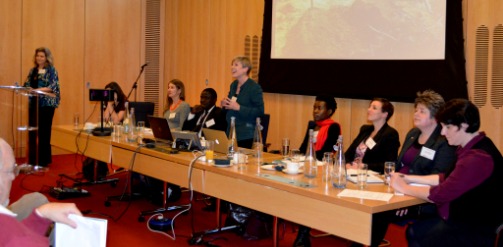The Ebola Response Anthropology Platform (ERAP) and the related Ebola: lessons for development initiatives led by Professor Melissa Leach at the Institute of Development Studies (IDS) have won the prestigious Economic and Social Research Council (ESRC) Outstanding International Impact Prize for their rapid and effective response during the epidemic.
In awarding the prize to Professor Leach and team, the judging panel stated, ‘it’s clear that the ERAP team had a direct impact on lessening the amount of deaths and spread of Ebola by ensuring that learning from years of research in the area was highlighted to the right people in the right organisations’.
Professor Leach said: “We are honoured to win this esteemed prize. ERAP and the related Ebola: lessons for development initiatives were collaborations bringing together key partnerships and decades of research supported and funded by many ESRC projects including the ESRC STEPS Centre. We are grateful for the support of the ESRC in enabling the long-term social science research so critical to understanding the contexts and drivers of global challenges, and that underpins our ability to mobilise in real-time when crises hit”.
As the Ebola crisis took hold in 2014 ERAP was up-and-running as a website in October 2014, published all its materials open access, and translated and publicised 70+ other key anthropological works. Providing a focal point for dialogue as the epidemic unfolded, the website energised US, European and West African networks, being accessed by 16,000+ users. Platform members delivered pre-departure training for 362 clinical personnel; co-designed and delivering teaching content for a MOOC on Ebola in Context; and conducted training sessions on ‘Outbreak Anthropology for Epidemiologists’ in London and Berlin.
The team led by Melissa Leach, included Annie Wilkinson (IDS), James Fairhead (University of Sussex), Ann Kelly (University of Exeter), Paul Richards (Njala University), Melissa Parker (London School of Hygiene & Tropical Medicine) and Fred Martineau (London School of Hygiene & Tropical Medicine).
The team organised a second initiative – Ebola: Lessons for Development – part-funded by ESRC STEPS Centre) that explored broader implications of the crisis. This drew the applicants together with 10 other IDS and Sussex-based researchers, West African partners and IDS communications professionals to produce 9 ‘IDS Practice Paper’ briefings, launching and debating these with 100+ development policymakers, humanitarian agencies and researchers in London on 25 February 2015.
Communications, social media, blogs and podcasts were supported by IDS, linking with formal media channels (including interviews/contributions to BBC Science in Action, BBC News Channel, The Guardian, Washington Post, Canadian Public Service broadcast). These initiatives also gave shape to UK and international strategy and on-the-ground action in West Africa. As a social science Sub Committee of SAGE, they advised the government Chief Medical Officer and Chief Scientist.
Professor James Fairhead, from the University of Sussex, and part of the team said: “As the Ebola epidemic was as much an epidemic of mistrust as of a virus, the part we played was to help humanitarian agencies understand political tensions and local customs, rebuild trust and enable more respectful engagement with affected communities. It highlighted the very real value of anthropology to government policy and might provide a model for future epidemic responses.”
In a field dominated by medics and virologists and other natural scientists, IDS and partners truly showed how valuable a collaborative and social science perspective can be.
Ends
—
Notes for editors
- Professor Melissa Leach and her research team were awarded the 2016 ESRC Celebrating Impact Prize for Outstanding International Impact and a prize of £10,000. The awards ceremony took place at Central Hall, Westminster on 22 June 2016.
- Other members of the team included Roland Suluku, Joseph Amara and Esther Mokuwa of Njala University who all played a key part in collecting, at considerable risk to their own safety, the real-time field data essential to ERAP’s effectiveness
- The Institute of Development Studies is a leading global institution for development research, teaching and learning, and impact and communications, based at the University of Sussex. Its vision is of equal and sustainable societies, locally and globally, where everyone can live secure, fulfilling lives free from poverty and injustice. We believe passionately that cutting-edge research, knowledge and evidence are crucial in shaping the changes needed for our broader vision to be realised, and to support people, societies and institutions to navigate the challenges ahead.
- For further information on the Ebola Response Anthropology Platform, see www.ebola-anthropology.net
- The Ebola Response Anthropology Platform is funded by a grant from the Research for Health in Humanitarian Crises (R2HC) Programme. The £8 million R2HC programme is funded equally by the Wellcome Trust and DFID, with Enhancing Learning and Research for Humanitarian Assistance (ELRHA) overseeing the programme’s execution and management.
- The ESRC Celebrating Impact Prize is an annual opportunity to recognise and reward the successes of ESRC-funded researchers who have achieved, or are currently achieving, outstanding economic and societal impacts. First run in 2013 and now in its fourth year, the prize celebrates collaborative working, partnerships, engagement and knowledge exchange activities that have led to significant impact of ESRC-funded research. In addition to the prize for Outstanding International Impact, prizes were presented in four other categories: Outstanding Impact in Public Policy, Outstanding Impact in Society, Outstanding Early Career Impact and Impact Champion.
- The Economic and Social Research Council (ESRC) is the UK’s largest funder of research on the social and economic questions facing us today. It supports the development and training of the UK’s future social scientists and also funds major studies that provide the infrastructure for research. ESRC-funded research informs policymakers and practitioners and helps make businesses, voluntary bodies and other organisations more effective. The ESRC also works collaboratively with six other UK research councils and Innovate UK to fund cross-disciplinary research and innovation addressing major societal challenges. The ESRC is an independent organisation, established by Royal Charter in 1965, and funded mainly by the Government.
